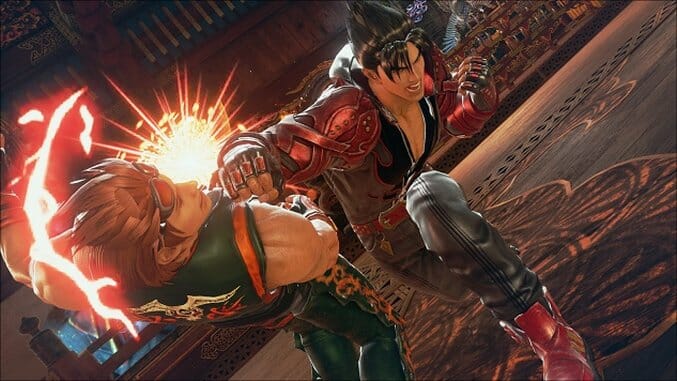Tekken‘s Katsuhiro Harada on E-Sports, Western Sensibilities and Fan Backlash
Photo by Yves Tennevin through Creative Commons
On an early November evening, the Ruby Skye club’s sidewalk was illuminated by lit banners featuring Heihachi Mishima, the villain and occasional mascot of Tekken. The historic building hosted the grand finals of the King of the Iron Fist 2016 tournament, the biggest Tekken tournament in America. In a small room upstairs, players were snacking in-between breaks and using small monitors to polish their Tekken skills to a blinding shine. Gerard Williams, Youtube’s HipHopGamer, sat down at a chair to play Tekken 7 and chat with his opponent about Tekken lore.
It was seemingly agreed upon that Street Fighter Akuma fit in well with the rest of the Tekken cast, as the two players traded off trying him out.
The series’ producer, Katsuhiro Harada, sat on a cordoned off area being grilled by interviewer after interviewer. Despite an occasional yawn, Harada was happy to take a picture in front of the Tekken 7 banner to his side, making a fighting pose with his fists. He wore a puffy red jacket with designs patterned to look like Yakuza tattoos, a fitting image for one of gaming’s most fanciful developers.
Harada is also well known for his trademark sunglasses, proudly wearing them even in a dark room—or so I thought, until he clipped the shaded lenses off and revealed that he wore simple, if understated, glasses. I am not sure how many interviewsHarada had gone through by the time we sat down, but it seemed to have been a great many by the break he needed prior to meeting. He fiddled with his phone before we talked, prompting Bandai Namco Communications Director Denny Chiu to lean over to me and begin a discussion about how we’re all bound to our cellphones and the people that need to reach us.
While waiting, I started chatting with Michael Murray, a designer on the Tekken team and Harada’s long-time translator. We talked for a bit about last meeting at the PlayStation Experience, an exchange that had a hint of surprise at how quickly time has passed in the last year. Harada finished with his phone, clipped his shades back onto his glasses, and sat down on the couch in front of me.
It is not unfair to say Harada is currently one of the decision-makers for the fighting game genre. While he does not issue edicts, his opinions and thoughts on the genre tend to command the attention of developers eager to know his thinking. Despite Street Fighter V being criticized, in part, for a lack of a proper method for new players to learn the game, Harada does not believe more tutorials will be game changers.
“It’s really tough because, you know, back in the early days of the arcades when fighting games were the most popular, we didn’t have internet and we didn’t have tutorial modes or anything like that,” Harada said. “It was more that people were just so interested in the game that they just continued to play and learned from the people around them.
“Right now, e-sports is very popular, so people focus on that top 2% that like to go to tournaments and things like that. But for a lot of people, it’s just about beating their friends or beating their brothers, and that was what was enjoyable about the game. But then they keep playing and perhaps they do eventually turn into one of those top tier players.” Harada paused, thinking for a second. “But maybe that’s not—solving the problem isn’t just making a more fleshed-out tutorial, it’s putting those hooks into the game that make people enjoy against their brothers and their friends and things like that, is the most important aspect to make a solid foundation for that.”
It is not surprising e-sports was on Harada’s mind, as loud cheers permeated the walls every few minutes from the audience downstairs. The King of the Iron Fist tournament featured the best Tekken players in the world and aired their matches online to bear that superlative out. When I asked Harada if e-sports actually end up hurting a fighting game by creating an expectation of skill most players won’t reach, he responded immediately.
“I guess you could say, it’s like in basketball. The problem there is like, if you can’t be Michael Jordan, would you play basketball? That’s not necessarily the case,” Harada said while looking to Michael Murray to make sure he got the name correct. “The same can be said for cars, we both like cars a lot, but that doesn’t mean I want to be a pro-race driver. But still, watching someone race that particular machine that we’re interested in, and see how far it can be taken, is similar to fighting games like Tekken. To see, in the hands of the pros, what kind of a game it could eventually be is still entertaining. It still propels us to buy that particular car or product, or that make or manufacturer, because the trust and value is there now that you’ve seen what it’s capable of, and also that excitement is there because you’ve seen what it’s capable of, even if you can’t be a world-class driver.”
